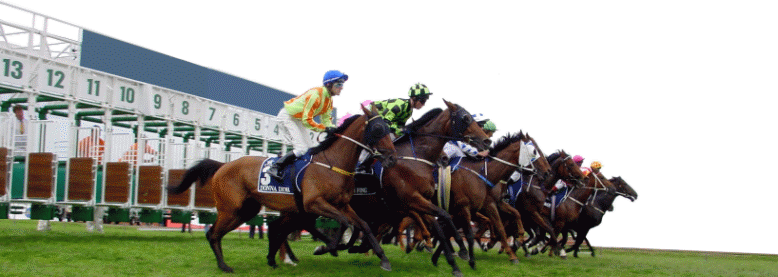
HORSE RACING TERMINOLOGY
Across the board:
When you bet a horse across the board, you are betting on the horse finishing in first, second and third (win, place and show). If the horse finishes first, you collect on all three wagers. If the horse finishes in second, you collect on the place and show wagers. Finally, if your horse finishes in third, you collect on the show wager.
Also-Ran:
All horses that do not finish in the money are called also-rans.
Backstretch:
The backstretch is the straight area of the track between the turns.
Bandage:
A horse that has bandages has cloth wound around the lower part of the legs.
Blanket Finish:
When horses finish a race packed together, it’s called a blanket finish.
Box:
When you box a horse on a wager, you are betting on all possible combination that horse can come in. Boxing is done on exotic wagers. For example, if you box an exacta with the 4 and 5 horse, you are betting on the finish 5-4 and 4-5.
Claiming Race:
In a claiming race, the horses racing can be claimed (bought). If the horse is claimed, the new owner takes ownership when the race is finished. Any money made from the race goes to the previous owner. Claiming races typically start around $2,000 at the low levels and go all the way up.
Clocker:
A clocker is someone who times workouts and races.
Closer:
A closer is a horse that saves the best for last. Typically a closer will only win a race when the horses in front get into a fast pace race and run out of energy.
Colt:
Male horse under five years old.
Daily Double:
The daily double usually involves the first and second races of the day. When you bet the daily double, you pick the winner of each race.
Exacta:
The exacta is an exotic wager where you bet on the exact win-place finish of a race. For example, if you bet a 4-5 exacta, the 4 horse must win and the 5 horse must place. If you box your exacta, it costs twice as much, but order won’t matter.
Field:
The field is all the horses running in a particular race.
Filly:
A Filly is a female horse four years old or younger.
Firm:
This is a track condition used on Turf tracks. It is the equivalent to fast on a dirt track.
Front-Runner:
A front-runner is a horse that tries to lead the field as far as possible. When you have a race with a few front-runners, the race is prime for a closer to challenge for the win.
Furlong:
A furlong is one-eighth of a mile, which is 220 yards.
Gelding:
A gelding is a castrated male horse.
Handicapper:
If you bet on horse racing, you are a handicapper-at least in the basic sense. Handicappers come in all degrees of expertise.
Horse:
A horse is an ungelded male horse five years old or older.
In the Money:
A horse that finishes first, second or third finishes in the money.
Length:
A length is the length of a horse from nose to tail-about 9 feet.
Maiden:
A maiden is a horse that has never won a race. When that horse finally wins, the horse breaks it maiden.
Maiden Race:
A maiden race is one in which the field is solely comprised of horses that have never won a race.
Mare:
A mare is a female horse at least five years old-can also be a female of any age that has been bred.
Morning Line:
Before the races go off, a linemaker guesses what the final odds of a horse might be based on talent and public perception.
On The Nose:
When you bet a horse to win only, you are betting on the nose.
Overlay:
When a horse goes off at a higher price that it should, based on past performances, that horse is an overlay.
Past Performance:
The past performance is a record of the races the horse has run in, how the horse ran and what happened in the race. It’s the primary item used in horse racing handicapping.
Photo Finish:
When two or more horses cross the wire and it’s too close to call, it’s called a photo finish. A photo is reviewed to see who the leader was. A photo finish can happen for first, second, third or fourth place.
Place:
Second place. When you bet on a horse to place, you win if the horse finishes first or second.
Post:
Starting point in a race.
Post Time:
When a race starts.
Purse:
The purse is the total prize money distributed to owners.
Quarter Pole:
The quarter pole marks one-quarter mile from the finish.
Quinella:
When you bet a Quinella, you are wagering on the first two finishers in a race. The order does not matter. For example, if you bet a 4-5 Quinella, the order of finish can be either 4-5 or 5-4. A Quinella pays less than an Exacta.
Route:
A route is typically described as a race of one mile or more. Many describe routes as races that have more than one turn.
Router:
A router is a horse that runs distance races well.
Scratch:
When a horse is scratched, that horse is removed from the race.
Show:
Third place finish. When you bet a horse to show, you win if the horse finishes first, second or third. It’s the most conservative bet in horse racing.
Simulcast:
To improve revenue, horse racing tracks permit the other locations to televise their races. Many tracks operate as simulcast locations on their off times.
Stretch Call:
This is the position of the race when one furlong remains.
Turf:
A grass course.
Win:
First place. When you bet on a horse to win, the horse must finish first.
Wire:
The finish line.

